Dear Church
I thought quite hard before writing this but I have been re reading a Bonhoeffer biography and last time I read it I was focussing on Bonhoeffers theology. This time I found myself constantly drawn to the political situation in th early 1930s right at the start of Hitlers rise and the churches failure to speak out, the internal politics of the more moderate voices (and the church) and how the Nazis used the social situation of unrest and unknown futures deliberately often using tactics of chaos, polarision, statements about recovery, moving on etc to manipulate and consolidate power. I have to say I see too many parallels with what is happening in the UK, (and the US) through the demonisation of socialism (ie how Corbyn was treated) preparing the way for a rise of right leaning politics, and the masquerading of elite political classes as being of/for the people and since Boris came to power how he and Cummings have access to even greater resources of the state for even greater manipulation. The whole contempt with which the public have been treated, blatant lies, then gaslightling concerned voices that we need to move on, the removal of Emily Matiliss from Newsnight for speaking truth to power, and the abuse of power through strategic ambiguity, is just too familiar after what I read in Bonhoeffers book, my spirit is ill at ease and I need to speak out.
The light in all this has been the bishops who have gone public, but the church is in danger of being complicit as the voices are still to few and internal wrangles have already started. Yes we need to pray for our leaders but we also need to stand up for integrity, and truth. Many of us will have seen the words of Niemöller “First they came for the socialists, and I did not speak out—because I was not a socialist.
Then they came for the trade unionists, and I did not speak out— because I was not a trade unionist.
Then they came for the Jews, and I did not speak out—because I was not a Jew.
Then they came for me—and there was no one left to speak for me.” And it is important to note many like Bonhoeffer warned Pastor Niemöller what was going on as far back as mid 1930s. So we need our Bishops and church leaders of all denominations to speak louder, speak now, and SPEAK TOGETHER, and we need to do our part in encouraging them to do, whilst ourselves standing up and speaking truth to lies and power where we can and we need to so now.
Faithfully
Richard
Category Archives: Zzzz … Old Stuff
The relentless fight for political freedom from the market, a missional response

At the height of the American Civil War, Abraham Lincoln gave and address at the Battle of Gettysburg in 1863 that contained these words. “this nation, under God, shall have a new birth of freedom – and that government of the people, by the people, for the people shall not perish from the earth.” What we sometimes forget, is that this battle was directly related to the global market system of the time. The battle in the USA was whether the State was there in the vision of the founding mothers and fathers of the nation to be centred on human freedom, or like many other nations, end up just another expression of an oppressive feudal state where the uber rich oppress the many. The battle at the heart of this civil war was for the right to enslave human beings as the cheapest form of labour in the growing of global commodities of the time. Lincoln won the battle, but I do not think he won the war. Looking back at the USA now in 2020, I think we can clearly see that the market won and civil rights has never been fully delivered in one of the most divided and unequal societies in the world.
What exists now in the USA and now in the UK is economic slavery, maintaining cheap labour with reduced employment and terrible wages. The Global Market won, and democracy and equality lost out. We are now all commodified and where human dignity is now in decline. You could argue that actually there has been a constant state of battle in the Western World ever since the Black death in 1346, when the feudal system and oppressive market society collapsed in the pandemic, as there were too few workers, so that wages and freedoms had to rise to ensure crops and industry were sustained. It was purely economics that drove this social change, and that since then there has been a battle between a society of justice and fairness v a market feudal oppressive system culminating in our current society. Until recently you could argue the market had won, but now in another global pandemic, will this give us an opportunity again to diminish the power and relentless scourge of the market society? Or will it actually make a more feudalist system more likely to be reimposed? How does the church respond?
We remember that Jesus’ entire ministry happened in the context of the oppression of the Jewish people under the super power of the time, and that included the imposition of an international market system at the time. It has always been a personal bafflement to me why Jesus did not call out this oppression at the time, other than Jesus being clear about money about fairness and money being of this world in Caesars name. The only hint of challenge to this, are the words of Jesus before Pilate after he had been flogged where he says “I am not of this world’. Chad Myers helpfully reminds us that the greek here for ‘world’ here is ‘Kosmos’ the same as ‘domination system’. With this in mind, Jesus is calling out the Roman Empire as a militaristic market society as a domination system and so we Christians, holding onto our understanding of Jesus ‘now but not fully yet’ Kingdom in the context of having to live in a domination system, but not of a domination system,
I want to point out at this point, I am not being an extreme Socialist or Communist, this is the stories of the Gospels and and Letters of the Apostles, and my thought has always been that more conservatively inclined Christians really need to get back the Gospel narrative, as you will be in for a shock!
So how do Christians react to the reality that our market society continues to oppression and now leads to destruction with global warming and ecocide. Mission has to start with economic, ecological and social justice. These are the heart of the Judaeo-Christian understandings of stewardship, jubilee and the Kingdom. We can not idly sit by and see successive governments just continue to oppress people. What will it take for Christians in the UK to stand up to the oppression of the market and the invisible power of the super-rich as Jesus sides with the unbearably poor? What will it take to seek a Government that prevents the excesses of the market system by what used to be called a mixed economy? What will it take for this to be seen by the church to be a missional priority? It is not just about evangelism , fresh expressions and new ecclesial communities. like Jesus turned over the market stalls in the temple for causing de-sacralisation, so we as Christians should be challenging and turning over the market stalls threatening the wellbeing of people and the continued existence of our planet. It is high time that the Christian Church rediscovered it’s calling and historic roots. Now in this pandemic, can we face this calling to prophetic witness and prophetic living.
Reading Systems Failure as Sign of the Times
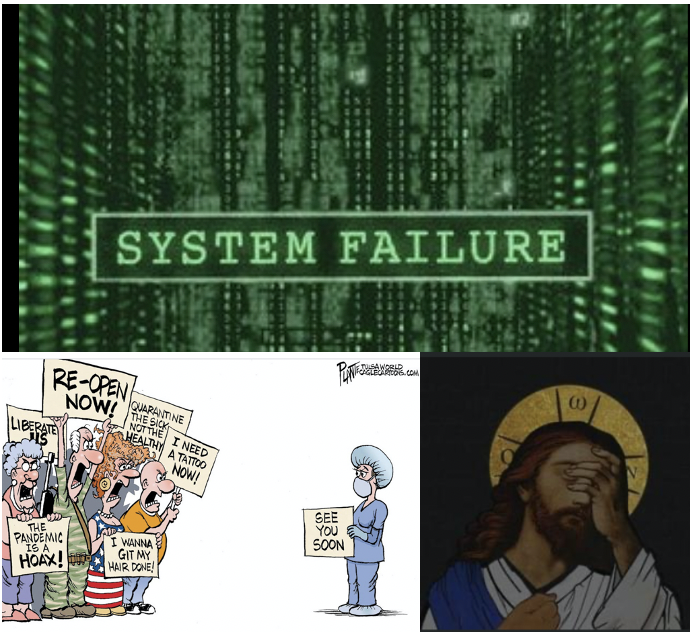 I do think some of the reactions in the USA for me just show how addicted we are, (not just how they are), to a consumerist capitalist system, and I really do think these are signs of system failure. Most of my life we have talked of the shifts from modernity to post modernity to post secularisation and the collapse of our financial system as the consequences of a system where money has become disconnected from the real when we ended the gold standard, and where the system has created economic slavery and an insatiable desire to use the worlds resources beyond what is sustainable and now faces global warming and ecoside.
I do think some of the reactions in the USA for me just show how addicted we are, (not just how they are), to a consumerist capitalist system, and I really do think these are signs of system failure. Most of my life we have talked of the shifts from modernity to post modernity to post secularisation and the collapse of our financial system as the consequences of a system where money has become disconnected from the real when we ended the gold standard, and where the system has created economic slavery and an insatiable desire to use the worlds resources beyond what is sustainable and now faces global warming and ecoside.
The dominance of a culture dictated by Economics now does not make any sense anymore, where the billionaires are forcing political leaders to get people back to work even when their lives are at stake with this virus because they are losing money. For too long now Economics has been more important than human decency and human dignity. We need to own that we are facing a global system failure and it is going to be very painful as predicted by Obama at the beginning of his presidency. My sadness is that many Christians and Churches are so addicted and emeshed into this current market society that they have become part of the problem not the solution. Our model of ‘Church as business’ has been proved impotent in this crisis, with many important pioneers furloughed and now not able to work at a time when we need them more than ever to help and reimagine a church and society in this change. I am convinced that the effects of this virus are part of this system failure, and we have not faced this yet, and the solutions brought in to ride the storm like a universal wage, reductions in activity and destruction of the earth are going to need to part of our future.
There will be no going back, we need to face the future and I am sure that God must look back at some aspects of the Church and weep. I will never understand how some can call themselves Christians with the stances they take which seem to me to have very little to do with the Gospels and Jesus” teachings. We Christians need to play our part in this painful time to face serious change as our global market system collapses, and not be part of the problem. It seems to me some aspects of the church are to deeply emeshed and polluted by ties to the rich and powerful they they have lost their prophetic place as God expected as being the Body of Christ and the visible expression of the invisible Kingdom of God. Give to Caesar what is Caesars and give to a God what is Gods.
Interestingly traditional religious communities with their shared purse and commitment to poverty obedience and chastity can continue as a model of discipleship resistant and counter cultural to our market society and “Church as Business”. This is why I think we need to start to think what does it mean to be a Christian community living out the faith as a rhythm of life and why I am committed to a more new monastic approach to understand how to be a Christian in the context of our changing world where I am seeking not to collude with a system in failure but live simply and seek to hold onto Jesus’ teachings concerning social, economic and ecological justice. May be the solution is that we need to do our own spiritual 12 steps to be able to face this. I recently had to face an addiction problem in my life and this has really helped me to face things in a way I have never been able to before. We need to face our own sitting down by the rivers of Babylon, so we can be part of the solution not the problem as the church unfortunately can be.
Sunday Papers In conversation
Just to let people know that over the next few weeks/month Sunday Papers is going to have some different voices posting. Following a few on line web chats a bunch of pioneer people will be using This blog to post thoughts about about how the church might inhabit the now and the not yet of the corona situation. So added a new category corona if want to access these posts. It’s a great line up people who might post so watch this space.
Is the normal we once knew worth returning to? – 10 Hyperglocal tips for a different future after lockdown
I’m fascinated by the ramping up of the magnificent marketing machine preparing the way for a return to consumerism. Yes I’m looking forward to the freedom post lockdown but if we come out of the situation unchanged I think we need to ask some pretty big questions of our own humanity. It’s great that so many people are considering whether the normal they once knew is worth returning to. There have been a few memes floating around and they are asking the same question in different ways and Russell Brand pretty much hits the nail here.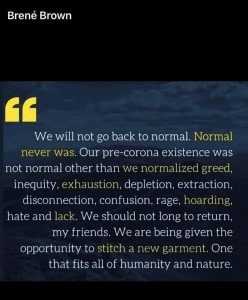
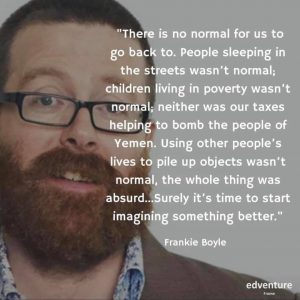
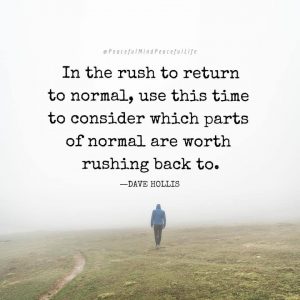
However what I want to suggest are 10 Hyperglocal tips towards a different future.
Glocal was a term mainly coined in business terms around how to be a global brand that rolls out local variations to suit a local market. Think Macdonalds offering different burgers in different cultures. Later the term was taken up by environmental activists exploring how to address climate change by thinking of the global climate crisis and acting locally. What I mean by Hyperglocal is about both the small elements of activism we can do locally but also share globally through social media networks etc so the first tip is just that:
1. Be Hyperglobal – share your thoughts and small acts of resistance to the normal, that once was, with the wider world. Whether you are a poet, a pray-er, a philosopher, a carer, a doctor, or a nurse, and let’s be honest, the voices of nurses and bus drivers questioning the lack of PPE and dying as a result of their jobs, are some of the most heart wrenching stuff we will ever hear.
2. Be Courageous – call out the bad normal that once was. I love that Captain Tom Moore has raised over £10,000000 for the NHS and I’m not criticising him, but why the hell does the NHS have to be supported by additional charity, not to mention that we have been underfunding the NHS and undervaluing key workers for decades.
3. Be Aware – Take time to respond to the feelings you are having about questioning the normal that once was. Pause and reflect and throw those questions and angst out into the ether of social media, you might be surprised who responds and how this can equip you to move forwards.
4. Be Attentive – Notice the small things. People have talked about hearing the birds in Wuhan or seeing the mountain goats in Llandudno, notice this stuff in your locality and use it to resource your resolve when bombarded by busy-ness on the return to “normal” either by noticing those small things that continue, or their absence when they get squeezed out.
5. Question Language – In fact question most stuff that’s media and marketing related. Already the marketing machine has shifted its message to being “with” you at this time, Amazon boss Jeff Bezos saw his wealth grow by $24BILLION since the start of corona, whilst many of their workers fear for their health, and when the chancellor suggests we need to get the balance between health and the economy, what does that really mean, and what is your local response to all this? Yes we might question the long term economic sustainability if we are trying to return to the normal we once knew but remember that normal was a mirage, so we don’t have to play the same game any more. Research and support different economic possibilities, suppliers and use the questioning of language to help build some resistance to the lies we were once sold and will be re-ramped up as soon as lockdown ends. Indeed we are likely to see marketing messages about returning to “normal” as doing our bit to help economic recovery, when what we really need is a recovery package more like the 12 step programme to challenge our addiction.
6. Help others find a new vocabulary – keep reinforcing the message that the real key workers aren’t the business bosses. Start locally to do stuff that helps by giving the supermarket workers a thumbs up, gifting something to the refuse workers, etc and share your ideas and actions with others. Look for the positives of the lockdown (I know for some this will be easier than others depending in circumstances) and frame your language around this to explain and remind yourself of different possibilities.
7. Act yourself into new ways of being – Learn different ways of doing, behaving and belonging. Do-Be-Do, don’t rush back to the old ways but pause and reflect each time after picking up an old activity to ask if this is needed, helpful, healthy or simply a quick fix to the false normal. Take time to learn how to grow your own food, get an allotment, learn how to meditate, make that career change/move you have always wanted.
8. Live a different rhythm – many people are putting in different spaces into their day to help them cope with the lockdown, time to read, time to chat online with friends, experiment now with what works for you and join online groups or connect with friends to help you keep these up afterward.
9. Keep being Neighbourly and keep volunteering – If the lockdown has taught us anything it has been the rise of good community neighbourliness. From the practical support to simply chatting over fences. We too easily exist in social media echo chambers, but we rarely choose our neighbours, and so they are a great resource for hearing difference. Equally the massive response to the request for volunteers was great, and volunteering is a great way to open yourself up to newness and break out the bubbles you’re in.
10. Be still and Still Moving – many people will have to for a time at least return to jobs they no longer really want to be in. But can we cultivate a stillness deep in our being that will carry us through as we take the steps we need to change to the new normal we might be dreaming of.
We need to talk about the Adjacent Possible
I know many people are just trying to cope, just trying to get through, some are trying to keep the show on the road, and few are still trying to carry on regardless but in a different format. But in the midst of this the opportunity to speak to the Adjacent Possible (see Jonnys blog post on this for some background) is probably greater than ever before, but the voices seem lacking and particularly voices from the faith communities.
People struggle to imagine a future they can’t see, and you can’t think yourself into a new way of being. So the possibilities of the moment are immense. People are having to live differently and inhabit new ways of being. But who from the church and how is the church speaking into this? I have had some fascinating conversations by posting simple questions into different Facebook groups eg I posted in a couple of Mountain groups How do your experiences of being lost in the fells help you cope with being in lockdown? In fact I got such good feedback it inspired be to use Lost as theme for a virtual Mountain Pilgrims experience on Sunday.
So how can we speak to adjacent possible? We need the artists and poets and this where we have seen some signs of hope, such as the NHS You clap me now and Tim AKA Beat liturgist Exploring the future and we can all do our part through local action, groups and online. However I wonder in these “unprecedented” times what we are being too called beyond the acts of service and love that the church has been brilliant at responding with such as keeping the foodbanks open, connecting and collecting shopping etc. With so many millions of people on lockdown, if only one or two percent of those people re-evaluate their life choices and decide to live differently after lockdown the culture shift could be seismic; are being called to speak into this? Can we draw on the wisdom traditions, to help people see the adjacent possible that so many are reaching for and is so tantalisingly close, and how might we do so on the scale of these unprecedented times. Let’s mobilise to speak to the adjacent possible (my offering is below), let’s dialogue with new people beyond our social media bubbles but let’s take a few risks to connect at scale for example I would love to see a conversation between Russell Brand and Rev Kate Bottley or Rev Richard Coles. What would you suggest, what future do you want to see and who are you talking about this with?
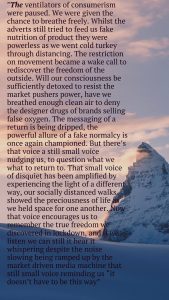
Sunflower Competition
During the corona out break we are running a sunflower comp. There are two pdfs that you might want to use locally.
The first is a poster to invite people in your street to join in:
poster http://www.sundaypapers.org.uk/wp-content/uploads/2020/03/poster.pdf
The second is a note to send spare seeds to friends note to go with seeds
http://www.sundaypapers.org.uk/wp-content/uploads/2020/03/note-to-go-with-seeds.pdf
Play and Dissent In complex systems
On the 8th Feb we are having a taster day for the certificate in pioneer mission that will be starting in September as part of the Northern Pioneer Centre. The day the Pastoral Statement landed I was planning a session for the taster event on the stories pioneers find themselves in and using Arbuckles notions of dissent and lament. Particularly how pioneers led by Jesus find themselves so often on the edge and how they need to value the experiences of seeing the beloved manifested in those places as resource for hope and a call to dissent. “There can be no constructive change at all, even in church, unless there is some form of dissent. By dissent I mean simply the proposing of alternatives, and a system that is not continuously examining alternatives is not likely to evolve creatively.”
Arbuckle Refounding the Church
I guess this is where the church (as denominations) often gets caught, as it fails to understand system complexity. This system complexity helps make spaces that try to examine, try to propose alternatives, and even try’s to listen (E.g. shared conversations) but is placed within an institution (and fixed false orthodoxy paradigm rooted in the enlightenment) that favours reductionism that can never compete with the complexities of following the way of love in the person Jesus. So dissent really matters, because orthodoxy that exists in a vacuum is not truth, and the Jesus way demonstrates orthopraxis that love is a way of dissent toward shalom.
At the same time my FB memory popped up with “ Whisper, somewhere beyond usefulness is a land where play reigns.” For May 29-31st we are following the Taster day with a Pioneer Fiesta(all ages welcome). In the heart of the Lakes there will be camping (with the opportunity to come early if you want a holiday) or book a B&B, and join in the stories, food and play. We are playing with different voices animating Mark 4 going to the other side of the lake. The word animating is used deliberately as there will be playful experiments including a messy take, an outdoors take, an artists take, an entrepreneurs take, a priests take, an inclusive take etc all around Mark 4. We are also Literally taking a paddle steamer to the other side of the lake and having a band and party on board. If you want to find out more email godforallevents@carlislediocese.org.uk.
At the moment I know I am called to be on the inside edge of this system and my commitment to the bride of Christ keeps me hanging there. At times I find playing with words is one of the few ways I can cope when the institution gets too much so here is an offering Of hopeful playful dissent.
Love is judged unworthy and tears of sadness grow.
Acidic edicts, camouflaged in priesty garments,
close doors to grace filled embraces.
Love sits outside with the masses
Bewildered at processes so reduced so disconnected
and so this holy water from different wells will flow.
giraffes and eco systems
Back in July I attended a HUI with CMS exploring creative theological education. Part of the outcome was thinking about ecosystems and giraffes because of this story and that actually there is always more space than we think to dance and play within the systems we are in.
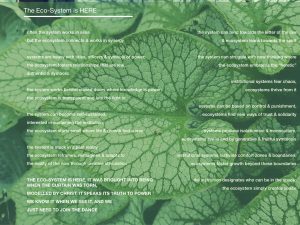
you can link to the poem above here
Contained by Mirrors
We had a great Mountain Pilgrims gathering last weekend. Thanks to Rob for leading. We went to Creiff where the Victorians had build a castle folly. Part of the reason for the folly was to create windows to frame the view, to tame and order the wild landscapes of Cumbria. We then slogged up the hill and used Claude Glasses. Where you stand with your back to the view and use a mirror to look behind you and again frame and tame the view. Unpacking this alongside 1 Cor 13v12 (we see through a glass/ a mirror dimly) it was easy to make the connections with how we seek to tame/box and confine G-d.
I love my current role (new job title Director of Mission Innovation and Fresh Expressions) in Cumbria and the ambition of the churches captured by the vision of God for All. But is wasn’t until a couple of days later that I joined the dots with a reflection we had with Johnny Sertin and how the God for All vision is a challenge where many are still operating within what Lamin Saneh calls the regulatory impulse. In this all our common worship, common prayer and, where mission, is shaped by this impulse to ‘fit’ good news into the existing forms we have inherited. God for All is moving from “temple” to kingdom. Our challenge is not to be subservient to historical time or even eschatological time in the guise of holding up tradition or passive towards the future but to embrace the G-d who has torn the curtain of the temple, and invites us no longer to stand with our backs towards her only seeing through a mirror dimly but to face the wonder, the opportunity, to know and be known, so that we move forward with the God who is for All in faith, hope and love.
